The debate on the merits of Google Ads vs SEO is an old one. I have studied many articles over the years on this subject. My view on this topic has shifted as more Analytics data and conversion information came to light. The first part of the post looks at the advantages and disadvantages of Adwords.
Most of Google Adwords advantages can be found in my earlier post about the power of Adwords. The majority of this Adwords article looks more at the negative side of paid Google advertising.
Looking at Google Adwords…..
Google Ads Ideal
It is often assumed that a professional Google Ads campaign plus a strong budget will deliver consistent results. Below is the ideal example of when Adwords will work very well. “Luxury home builders nsw” is a long tail keyword but Clarendon Homes is the only advertiser at the top of page one. At a very low CPC of $ 2.26, they have a great ad profile for this keyword.
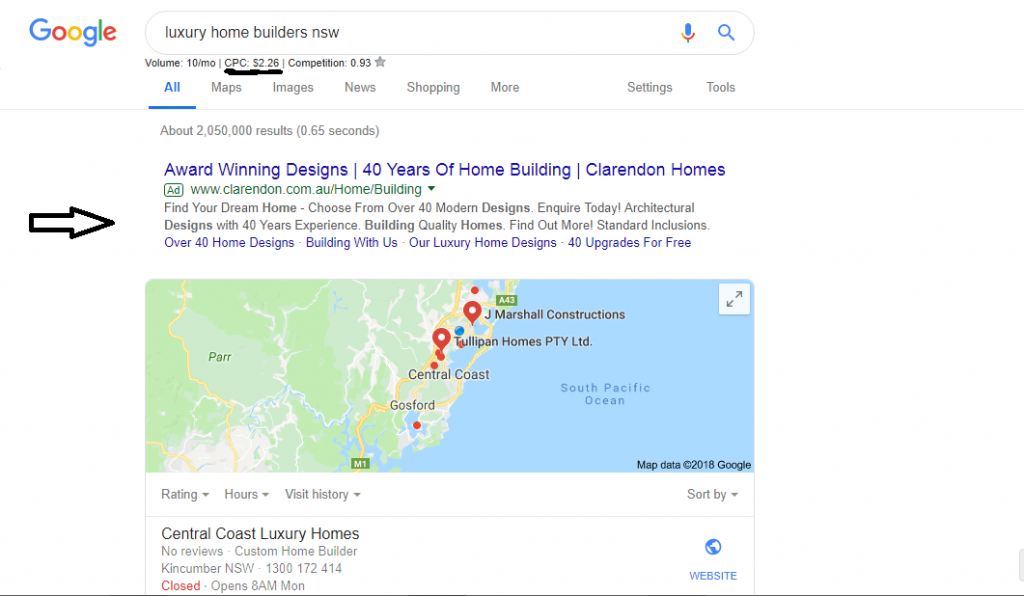
Second Best Adwords Scenario
Multiple Google Ads at the top. The choice is good for the consumer but not ideal for the advertiser. Ad construction and headlines plus descriptions become more important in this instance. This leads to the browser choosing your ad to click on.
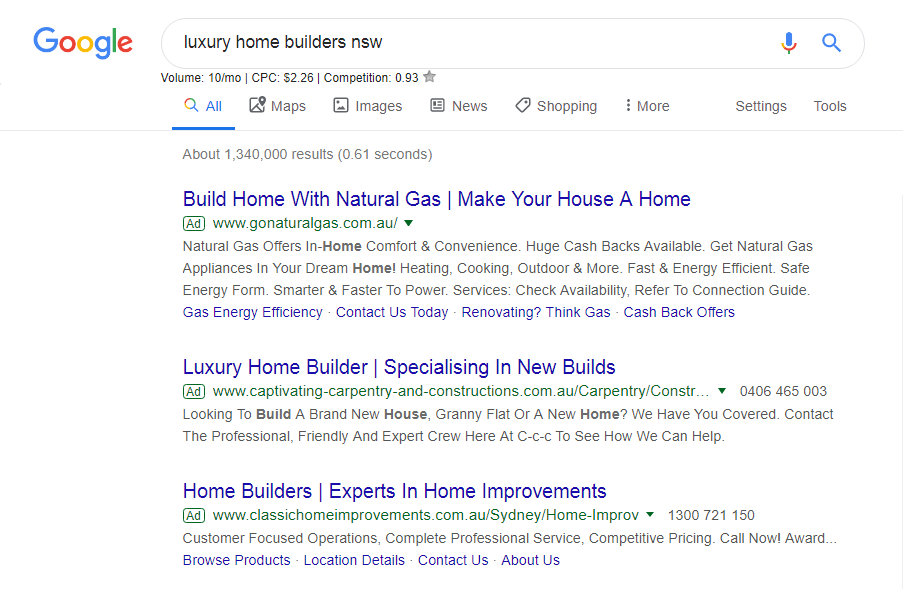
Google Ads Failure
However, Google Ads are not always at the top of page one. The quest for finding cheaper long-tail keywords is quite often hindered by Google Algorithms. It boils down to when Google shows ads at the top of page one and when there are zero paid listings at the top.
As an advertiser, you would assume that if you target a keyword and bid competitively, you will appear at the top of page one. This is not always the case. Google may decide to show no ads at the top of page one. The search volume and level of competition has to be high enough for this to happen. So if you are a fanatical advertiser following best practice, studying all search terms and building unique long-tail keyword Adgroups, you can still run into a situation where SEO listings outperform sections of your campaign.
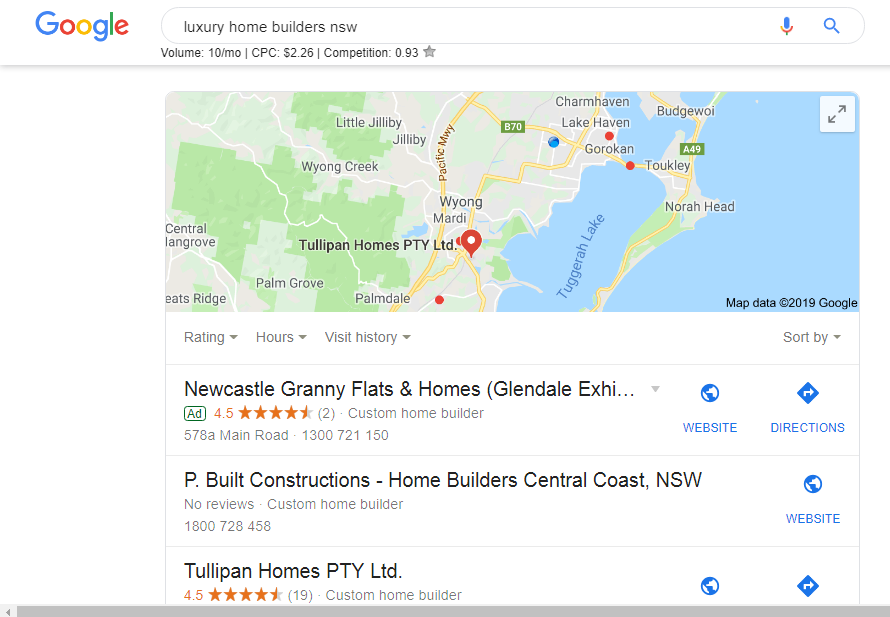
Scourge of Adwords Competition
Adwords is a brilliant tool for many advertisers. Some types of industries do not get great traction. Fortunately, home services are well suited to benefit from Google Search Ads campaigns.
Competition is a good thing. Quite often online advertising is in the hands of companies or individuals who do not follow best practice. The result is that Adwords advertisers do not get value for money.
Here are some common mistakes:
Limited Adgroups. Building a campaign with limited Adgroups and competing aggressively for competitive keywords. The screenshot below highlights the issue.
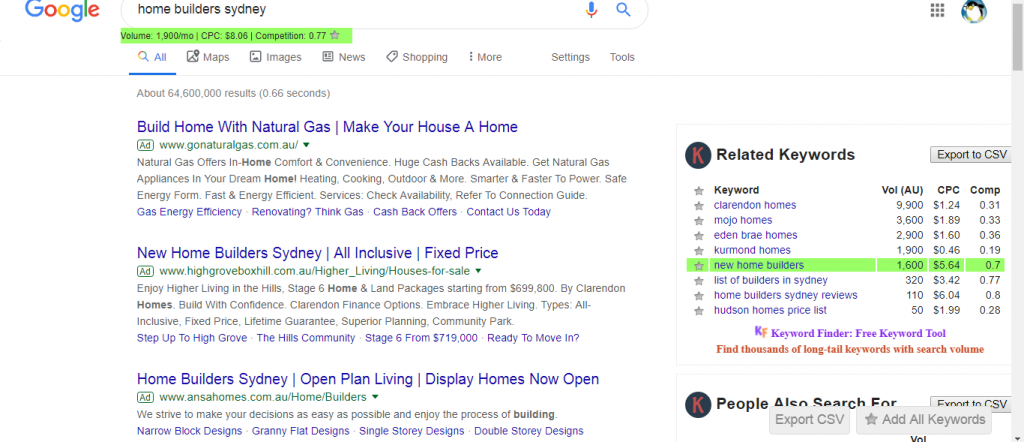
There are hundreds or even thousands of longer tail keywords where advertisers can compete more effectively. It takes more work with many more Adgroups, ads, and keywords. The CPC is much lower. Your advertising budget goes much further. Compare the CPC of $2.26 of “luxury home builders NSW” to “home builders Sydney” of $8.06. Both represent one click of one visitor so it makes no sense to chase competitive keywords until you have exhausted longer tail keyword options.
Poor Search Matches. There is a glaring example of this in the top Google Ad. Companies selling gas should not advertise in a home builder Adgroup. This ad leads to very low CTR’s (click-through rate) and also a weak landing page experience. For every 100 searches, there may be 3 clicks on this ad. The CTR of 3% is considered very low for the number one position on page 1. Those 3 visitors may land on a page selling gas and realise that this is not what they are looking for. The very high bounce rate that follows may lead to a complete waste of advertising budget.
Here is the thing: Google rewards accurate searches with lower CPC costs. Google also penalises poor searches with higher CPC costs. Adrank factors make a huge difference to the Performance of Adwords. More information on this implication of poor searches is found in my earlier post.
Not writing good adverts. Google is a fantastic place to experiment with ad copy. Too often, features of Google Ads are not used or there is just no call to action. Advertisers need to work out which types of messages resonate with their potential consumers.
Google has introduced Expanded Search Ads, Dynamic Search Ads and Responsive Search Ads during the last couple of years. With the last two options, the objective is to try and simplify ad testing and content creation. Initial testing of these features is inconclusive. Some Adgroups work better with expanded ads whilst Dynamic Search Ads have a role to play when the advertised website contains quality content.
Poor Geo-targeting. Many advertisers service a specific area. Poor targeting leads to wasted advertising budgets. House builders in Sydney are unlikely to accept projects in other countries or even other states. Adwords country/state/city exclusion lists are not always being used effectively.
Negative Keyword Neglect. Quite often negative keyword lists are very limited or non-existent. This is very wasteful as you need to block bad searches with negative keywords. In a campaign about building homes, words like “job”, “career”, “law”, “regulations”, “salary” should all be negative keywords. At times negative keywords are also used to differentiate between Adgroups to prevent Google keyword triggering a more expensive Adgroup option.
Click Fraud. Many advertisers are targets of sophisticated click fraud that Google cannot detect. Companies like Click Guard provides a great service to combat this issue. Click fraud runs into billions of dollars of wasted Adspend each year. Google is testing an alternative system (calls instead of clicks) of advertising which may eliminate a lot of fraudulent behavior.
CPC bidding panic. When businesses are exposed to seasonal fluctuations there may be a reaction to question an Adwords campaign effectiveness. The logic that the campaign worked well for most of the year is quickly forgotten. Google Ads managers may recommend a campaign budget increase to try and spend the company out of the malaise. I have seen little evidence that this strategy works. Panic bidding drives costs up for all advertisers and makes only one entity happy – Google.
Poor Adwords Management Advice. The reality is that Google Adwords managers or often poorly trained and giving conflicting advice. As Adwords has become more complicated, the quality of Google advice declined. Managers are rotated every three months and take little ownership of recommendations that they make to a specific advertiser. Through the years their advice led to poor bidding strategies, inappropriate campaigns, and ineffective ad types. Google replies to complaints are quite often limited to their standard apology. Automated bidding recommendations is another Adwords campaign suggestion that I have tried, tested and found wanting. Wordstream (the leader in Adwords management) are in agreement with this statement.
The Power of SEO
Effective Websites
The starting point of solid organic traffic is a great website. So what makes for an effective website?
- Fast Local Hosting
- Effective On-Page SEO
- Proper Internal and Outbound Linking
- Mobile Functional and Ready
- Websites of Value to Browsers
- Good Interaction With Google Bots
- Quality White Hat Backlinks
I have just mentioned a few things that make a difference. For in-depth website and SEO analysis, it is well worth investing in SEMrush or MOZ who have fantastic software to help you and your website developer improve the organic profile of your website.
Google My Business Listings
Local Organic listings are also very closely connected with Google Places. The stronger SEO site will have many more Places listings for an array of keywords. You need to ensure that your customers give you reviews and that you respond to the reviews regardless of whether they are good or bad.
Currently, Google My Business listings are used by Google Home when a verbal search is made in Australia. I expect this to change to Google Ads as verbal searches become more commonplace.
Google My Business listings are crucial where there are no Adwords listings at the to of the page. The debate of Google Ads vs SEO changes when this happens.
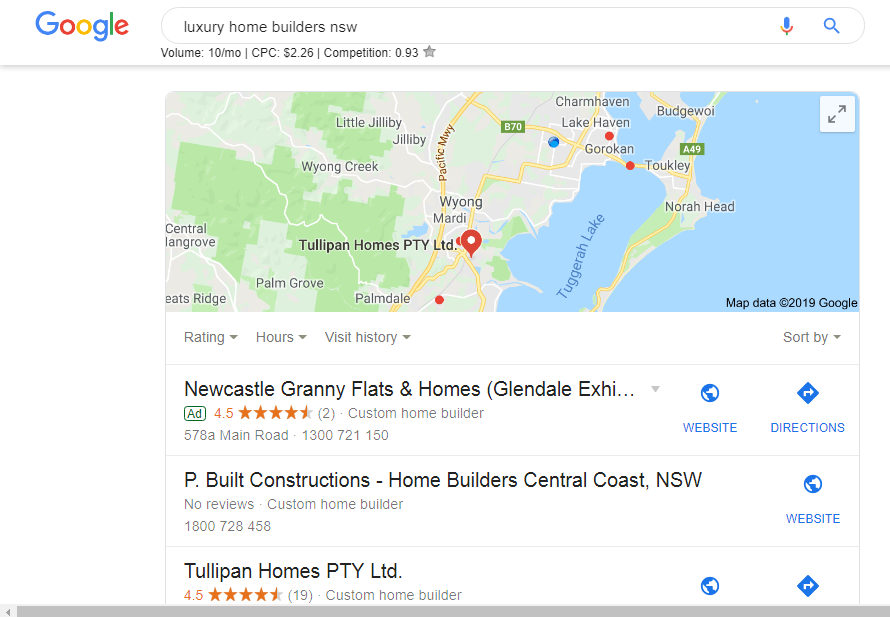
Trust Issues Google Ads vs SEO
Google Analytics provides great insights into browser behavior. From devices used to time spent on a website to conversion actions taken. Visitors trust SEO and Google My Business listings more than Adwords. This is still true even after Adwords has been significantly improved over the last years making searches much more accurate.
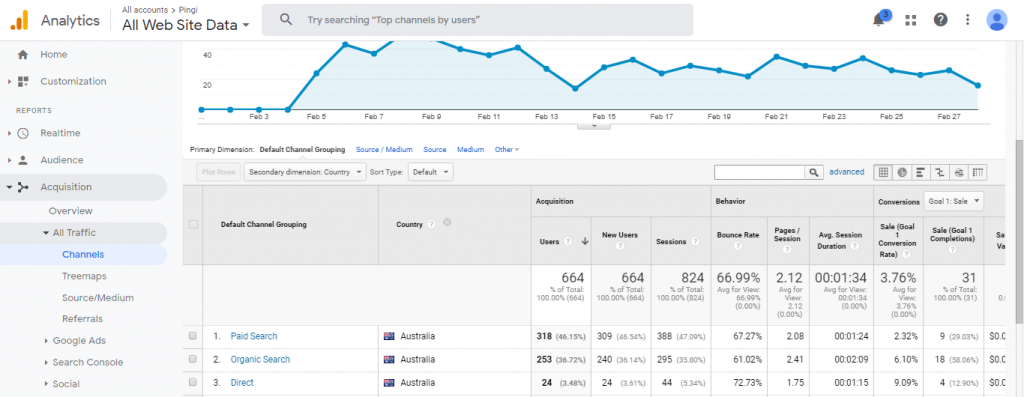
I chose Analytics data from February 2019 for our Pingi E-commerce business because the conversion data mirror sales. Organic traffic outperforms paid Adwords in every respect. SEO has lower bounce rates, more pages viewed and double the conversions (sales). The average organic visitor also spent almost twice as much time on the website.
Downsides of SEO/organic listings
Local struggles against National
Local companies are now at a distinct disadvantage to national websites. it is much easier to get strong SEO positions for a company that has national or international exposure.
Good SEO is Difficult and Expensive
You are reliant on SEO professionals to get strong increases in your organic traffic. It also takes many months for a SEO campaign to get results. Choosing an appropriate company can be a minefield. There is very little transparency and because SEO suppliers will blind you with technicalities, making an accurate choice becomes difficult. The fact is that online marketing is quite unregulated and full of companies that provide poor results.
SEO and Google My Business pushed down on page 1
Google has in my opinion, an ongoing strategy to promote Adwords above any other listings. This will increase over time with possibly more paid listings allowed at the top of page one. The Google Homes Services Ads are being trialed in the USA which is essentially Ads from Google preferred suppliers.
Google Ads Improvements
Through bidding and market segmentation, the paid section of Google has become more effective and accurate. I believe there will be additional market segmentation and other features added into Adwords. It may eventually overcome some or most of the current consumer trust issues. Increased Adwords effectiveness will come at the expense of SEO/organic searches.
